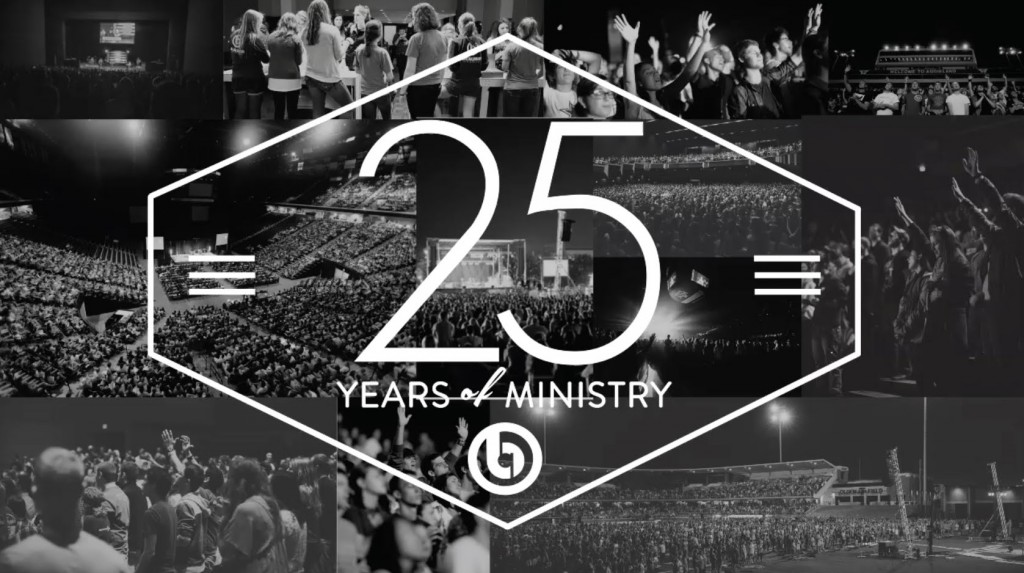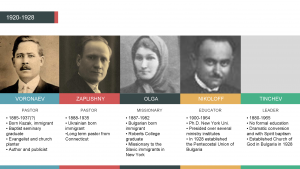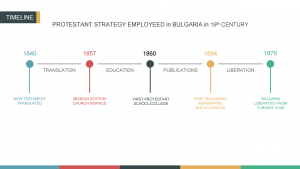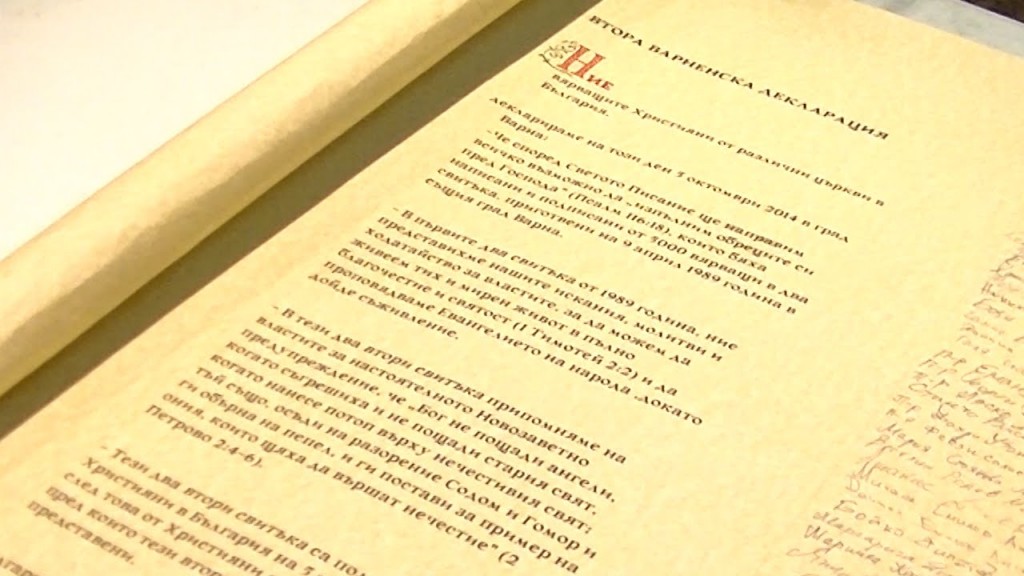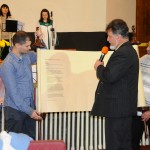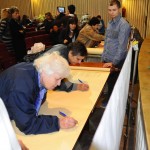Celebrating 25 Years in the Ministry
We’ve completed another successful term of ministry for 2015 marking a decade since the start of Mission BULGARIA in 2005 and also our 25th anniversary in the ministry. From humble beginnings in September of 1990, God has taken us to a full quarter century of ministry literally throughout the globe.
As the Thanksgiving season is now upon us, we will be commemorating this event more extensively with a series called “25 Years of Miracles.” The series contains testimonies with various healings and miracles from our ministry, which we’ve collected and recorded through the years.
We are grateful to the Lord for giving us the opportunity to preach the Gospel and be a part of your life through our ministry. Thank you for your partnership and friendship through the years and Happy Thanksgiving!
Bulgaria 2015 Election Results
According to the latest exit polls, GERB won nearly 34.5 % of the votes nationally in yesterday’s Bulgarian local election’s and the ruling party’s incumbent mayors were reelected at first round in major cities such as Sofia, Varna, Burgas, Stara Zagora, Veliko Tarnovo and Blagoevgrad. The candidates of GERB will stand in run-offs in other major cities such as Plovdiv, Shumen, Haskovo and Vidin.
The incumbent GERB mayors of the cities of Ruse (Plamen Stoilov with 51%), Stara Zagora (Zhivko Todorov with 75%) and Veliko Tarnovo (Daniel Panov with 57%) were all reelected at the first round of Bulgaria’s 2015 local elections held yesterday. According to the latest exit polls, run-offs for the mayors of the cities of Plovdiv, Shumen and Vidin are likely to take place as no candidate garnered more than 50 % of the votes at the first round of the local elections.
Plovdiv‘s incumbent mayor Ivan Totev (GERB, 36.6%) will face Slavcho Atanasov (Patriotic Front, 19.6%) in a run-off next Sunday.
In Shumen, GERB”s Lyubomir Hristov (37%) will face Bulgarian Socialist Party’s Ivan Ivanov (19%) in a run-off.
In Vidin, Rosica Kirova (27.67%), the candidate of local coalition “United for change” will face GERB’s Ognyan Tsenkov in the run-off.
GERB’s Yordanka Fandakova, the incumbent mayor of capital city Sofia, was reelected to a third consecutive term with 60 % of the votes.
Initial exit poll results after Bulgaria’s October 25 2015 municipal elections confirmed Prime Minister Boiko Borissov’s centre-right GERB party as the country’s strongest political force, as it turned in results similar to those in the October 2014 early national parliamentary elections. Putting figures from exit polls after municipal elections next to official results from a parliamentary election is not, of course, a fully fair comparison and should be seen only as a snapshot of political fortunes.
Turnout at local election is estimated at least around at 43.2%. According to estimates by Alpha Research, GERB got 34.5 per cent of the vote countrywide in October 2015. In the October 2014 parliamentary elections, GERB got 32.67 per cent, according to official Central Election Commission figures. In October 2015, the Bulgarian Socialist Party got 17.2 per cent of the countrywide vote, against its 15.4 per cent in October 2014. The parliamentary opposition party, however, again failed to win any major city.
Government Elections in Bulgaria (2005-2015)
 2005 Parliamentary Elections
2005 Parliamentary Elections
2006 Presidential Elections
2007 Municipal Elections
2009 Parliamentary Elections
2009 European Parliament elections
2011 Presidential Elections
2011 Local Elections
2013 Early parliamentary elections
2014 Early Parliamentary Elections
2015 Municipal Elections
NATO begins largest airborne training exercise since Cold War in Bulgaria
 Nato begins an airborne training exercise on August 24 in Bulgaria, Germany, Italy and Romania, the largest such combined airborne training on the continent since the end of the Cold War.
Nato begins an airborne training exercise on August 24 in Bulgaria, Germany, Italy and Romania, the largest such combined airborne training on the continent since the end of the Cold War.
As part of Exercise Swift Response 2015, which is being held from August 20 to September 13, Bulgaria is hosting a simulation of an airborne assault with paratroopers and landing of equipment. This is to take place around the Tenevo and Balchik airfields and at the Novo Selo training ground in Bulgaria. About 400 military personnel from the US, Italy and Bulgaria will be involved, using 12 C-130 aircraft, and 12 helicopters.
Bulgaria’s Defence Ministry said that south of Yambol, near the villages of Tenevo and Karavelovo and near Balchik municipality, there would be night flights at various heights. It was possible that residents would be bothered by the noise of the aircraft, the ministry said.
The US Army Europe said that Swift Response 2015 was designed to integrate multiple Allied nations’ high-readiness forces to operate as a cohesive team and demonstrate the Alliance’s capacity to rapidly deploy and operate in support of maintaining a strong and secure Europe.
The exercise is taking place in Germany, Romania, Bulgaria and Italy; and includes more than 4800 Soldiers from Bulgaria, France, Germany, Greece, Italy, the Netherlands, Poland, Portugal, Spain, the United Kingdom and the United States.
Swift Response 15 will include simultaneous airborne joint forced entries in to Germany’s Hohenfels Training Area and Bulgaria’s Novo Selo Training Area with follow-on training at both locations. The exercise will conclude in early September with multinational platoon and company live fire at the Grafenwöhr Training Area.
The US contingent will be led by headquarters elements from the Army’s XVIII Airborne Corps and the 4th Infantry Division Mission Command Element, and will include the Europe-based 173rd Airborne Brigade, and the US-based 1st Brigade, 82nd Airborne Division.
Swift Response 15 marks the first time the 82nd Airborne Division has operated in Europe since supporting NATO operations in Kosovo in 1999. The 1st Brigade, 82nd Airborne will assume responsibilities as the Army’s Global Response Force (GRF) from the 2nd Brigade, 82nd Airborne at the end of the year, with the mission of being able to deploy anywhere in the world within 96 hours of notification.
The Guardian: US to deploy marine unit in Bulgaria
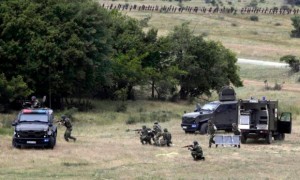 Troops with tanks, armored vehicles and artillery to be in place by September to help counter European concerns about Russia’s involvement in Ukraine
Troops with tanks, armored vehicles and artillery to be in place by September to help counter European concerns about Russia’s involvement in Ukraine
A Marine Corps unit equipped with tanks, light armored vehicles and artillery will be sent to Bulgaria in September as part of US efforts to reassure Nato allies worried by Russia’s involvement in Ukraine. Brig Gen Norman Cooling, the deputy commander of the US marines in Europe and Africa, said on Thursday that 155 troops equipped with four Abrams battle tanks, six light armored vehicles and three howitzers were scheduled to be deployed at the Novo Selo training area by early September. He spoke as NATO defense ministers met in Brussels.
“It’s certainly our intent to convince the Russians and Mr Putin to refrain from aggression and return to the community of peaceful nations,” Cooling said.
The US defense secretary, Ash Carter, said this week that more US military equipment would be positioned in Estonia, Lithuania, Latvia, Bulgaria, Romania, Poland and Germany as NATO seeks to bolster its forces in eastern Europe. Cooling said that in addition to being a deterrent, the unit would train with Bulgarian, Romanian and other troops over the next 18 months to improve US forces’ ability to operate with counterparts using different equipment and methods. “Ideally this culminates with integrated exercises, with units from more and more allied nations that are able to call for fire from one another’s artillery, our tanks maneuver in support of their infantry units, and vice versa,” he said.
First Pentecostal Missionaries to Bulgaria (1920)
Historical and Doctrinal Formation of Holiness Teachings and Praxis among Bulgarian Pentecostals (Research presentation prepared for the Society of Pentecostal Studies, Seattle, 2013 – Lakeland, 2015, thesis in partial fulfillment of the degree of D. Phil., Trinity College)
Interestingly enough, the arrival of the first Pentecostal missionaries to Bulgaria was not associated with starting new churches. Neither was it purposing a takeover of existing protestant congregations or the traditional for Bulgaria Eastern Orthodoxy. First Pentecostal missionaries Voronaev (far left) and Zaplishny served as a pastor in the United States, but their goal in Bulgaria was to preach Pentecost in already established churches. Zaplyshny’s wife Olga, who was from Bulgaria, enjoyed her home church which was more than sufficient for the hand full of believers.
It was common in 1920 that whole congregations of traditional protestant churches in Bulgaria would convert to Pentecostalism. However, it was not until almost a decade later when in 1928 the nephew of Olga Zaplishny – Nicolas Nikoloff who was educated in the States was sent by the Assemblies of God to organize the Pentecostal movement in Bulgaria. Initially only 7 congregations agreed to his proposal to be included into the new Pentecostal Union and registered with the government. They were predominantly in Southern Bulgaria around the city of Bourgas where the Zaplishny family settled and labored. The rest remained under the leadership of Stoyan Tinchev (far right) calling themselves Free Church of God. They later formed churches in North Central Bulgaria, near the city of Varna where Voronaev resided.
Less than a decade old, the Bulgarian Pentecostalism movement split between the churches that registered with the government and the churches which refused to register. There were some later differences in their view on sanctification, Baptism with the Holy Spirit, leadership and organizational structure. Nevertheless, the preaching of Pentecost became the entry point for Spirit baptism among mainline churches and new converts.
The gifts of the Spirit were also contributing their part in the work. A well known example, in the first Baptist church in Bulgaria, the pastor’s daughter received the Holy Spirit and the whole church followed. And there are even some who suggest, that glassollalia had been previously experienced by some orthodox mystics in Bulgaria as related to the Russian Molokans from the Romanina city of Tulcha. With all this evidence, the baptism with the Holy Spirit was viewed as mandatory for salvation among early Bulgarian Pentecostals. Along with salvation and water baptism, it became known as “the fullness” of spiritual experience. One could not go to heaven without “the fullness!”
Protestant Strategies in Bulgaria during the 19th Century
April 20, 2015 by Cup&Cross
Filed under Featured, News, Publication
Historical and Doctrinal Formation of Holiness Teachings and Praxis among Bulgarian Pentecostals (Research presentation prepared for the Society of Pentecostal Studies, Seattle, 2013 – Lakeland, 2015, thesis in partial fulfillment of the degree of D. Phil., Trinity College)
The early Bulgarian protestants were mainly Methodists and Congregational. They followed the strategy of the American and British missionaries, which began with a translation of the Bible in the 1840s, followed by the first mission stations and protestant services in the 1850s.
In the following decade, Protestant schools were established in over a dozen Bulgarian cities. A broad stream of educational publications were translated and provided to schools, churches and the open public. The final goal of the missionary strategy was the establishing of churches, which began in the 1870s and continued onward.
The main sources of influence were the American Board of Commissioners for Foreign Missions (setup in Boston) with its local centers in Turkey and then Bulgaria; as well as from the British and Foreign Bible Society which also had centers in Constantinople and its main Slavic arm through the Russian Bible Society based in St. Petersburg.
Additionally, Baptists entered Bulgaria with their own mission work in 1875 and the Adventists in 1891. Although there were no Presbyterians churches in Bulgaria at that time, many of the agents sent by American Board of Commissioners for Foreign Missions were in fact Presbyterian and were educated at Princeton and Drew along with many Bulgarian protestants who studied abroad.
With all these key players present, Bulgaria was eventually introduced to the rise of Higher Criticism (1880–93) and consecutively to the movement to revise the Westminster Confession of Faith (1900–1910). It was met with great resistance among Bulgarian churches. In this context, the search for holiness among Bulgarian evangelicals began at turn of the 20th country not only as an alternative to the liberal theological thought and praxis, but as a move toward a renewed spiritual identity, which ultimately became the channel for introducing Pentecostal-Holiness teachings.
Scroll Signing Service in Varna, Bulgaria

 25 years after the Fall of the Berlin Wall, people in Eastern Europe are still haunted by the spirit of communism. The Regime robbed them not only from happiness and freedom, but from their deep human ability to even imagine a better and free world. For this very reason, we wrote the book “Looking over the Wall” as our prayer for a new prophetic re-imagination of the present reality. After laboring in Bulgaria for over 25 years, in 2014, we were thrilled to minister to churches and people that are dreaming and re-imagining God’s purpose for Bulgaria along with us. Join us in re-imagining imagination anew:
25 years after the Fall of the Berlin Wall, people in Eastern Europe are still haunted by the spirit of communism. The Regime robbed them not only from happiness and freedom, but from their deep human ability to even imagine a better and free world. For this very reason, we wrote the book “Looking over the Wall” as our prayer for a new prophetic re-imagination of the present reality. After laboring in Bulgaria for over 25 years, in 2014, we were thrilled to minister to churches and people that are dreaming and re-imagining God’s purpose for Bulgaria along with us. Join us in re-imagining imagination anew:
1. Purchase the book from Amazon
2. Read it with your church family
3. Help us pray for a renewal of a new prophetic re-imagination in the minds and hearts of the people in Bulgaria and Eastern Europe
https://www.youtube.com/watch?v=-kHytj8yK8E
Second Varna Declaration (October 5, 2014)
We,
The believers from different churches in Bulgaria declare on this day of October 5th 2014 in the city of Varna,
That we, according to The Holy Scriptures, will do our best to “fulfill the vows to the Lord” (Psalm 116:14), which were written and signed by 5,000 believers in the two scrolls produced on April 9th 1989 in the same city of Varna
In which we presented our requests, prayers and intersession for those in authority, that we may live peaceful and quiet lives in all godliness and holiness (1 Timothy 2:2)
Reminding now our authorities in these two second scrolls about the urgent New Testament warning, that “God did not spare angles, when they sinned and He did not spare the ancient world, when He brought the flood on its ungodly people, and that He did not spare Sodom and Gomorrah but burned them to ashes and made them an example of what is going to happen to the ungodly” (2 Peter 4-6).
These two second scrolls are again signed by Christians in Bulgaria both on October 5, 2014 and further on by Christians all over the country, to whom these second scrolls are being brought and presented.
On behalf of the Bulgarian Christians
Read Also:
- Prophetic Revival in Bulgaria: The Search for Holiness Continues
- 25 Year Revival Cycles in Bulgaria’s Protestant History
Bulgaria election winner forms new government
![_68914373_68914321[1]](https://cupandcross.com/wp-content/uploads/2014/11/68914373_689143211-300x168.jpg) SOFIA, Bulgaria – Bulgarian President Rosen Plevneliev has formally given the winner of recent parliamentary elections a mandate to form a new government, seeking to restore stability in the poorest EU member country.
SOFIA, Bulgaria – Bulgarian President Rosen Plevneliev has formally given the winner of recent parliamentary elections a mandate to form a new government, seeking to restore stability in the poorest EU member country.
Conservative Boyko Borisov won the largest share in Oct. 5 early parliamentary elections, ousting a Socialist-led coalition. The 55-year-old former bodyguard and mayor of Bulgaria’s capital, Sofia, founded his center-right GERB party in 2006, and was prime minister between 2009 and 2013. Borisov’s party won only 84 of the 240 parliamentary seats, and he faces the hard task of forming a right-wing coalition with sufficient support in the fragmented legislature.
The winner of Bulgaria’s parliamentary election signed an accord on Thursday to form a minority coalition government after a month of talks, a welcome breakthrough for a country reeling from a bank crisis and struggling to revive economic growth.
- Minority centre-right govt to rely on allies for support
- PM-designate Borisov was toppled by protests in Feb 2013
- New cabinet must tackle bank crisis, fiscal deficit
- Parliament expected to approve govt on Friday (Adds quote, details, background)


